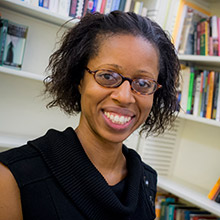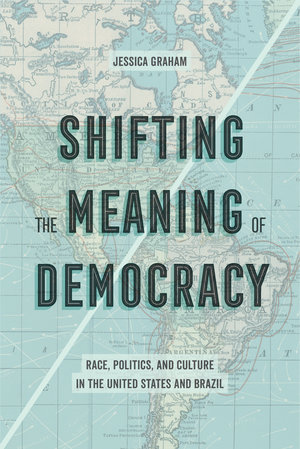Updated May 26, 2021
This week for #LASA2021, we’re proud to be celebrating the accomplishments of Jessica Graham, author of Shifting the Meaning of Democracy: Race, Politics, and Culture in the United States and Brazil. The book has won the Latin American Studies Association’s 2021 Bryce Wood Book Award and the 2021 Luciano Tomassini Latin American International Relations Book Award!
A critically acclaimed work, Shifting the Meaning of Democracy has now won several major awards:
- SSSP Global Division Book Award 2020, Society for the Study of Social Problems, Global Division
- Bryce Wood Book Award 2021, Latin American Studies Association
- Luciano Tomassini Latin American International Relations Book Award 2021, Latin American Studies Association
- Warren Dean Memorial Prize 2021, The Conference on Latin American History
- Outstanding First Book Prize Finalist, Association for the Study of the Worldwide African Diaspora
- Roberto Reis Book Award, Brazilian Studies Association
- Antonio Candido Prize Honorable Mention, Latin American Studies Association, Brazil Section

In honor of these awards, we’re sharing a previous conversation between Acquisitions Editor Kate Marshall and Graham about her book. In the interview below, Graham shares insights into her writing process for this ambitious historical work, how the concept of racial democracy is crucial to understanding the politics of the present, and her current work on the Black Studies Project at UC San Diego.
Jessica Graham is Associate Professor of History at UC San Diego and an historian of the United States and Brazil. Her book, Shifting the Meaning of Democracy, explores a crucial period, from 1930 – 1945, when the concepts of democracy and nation were redefined in terms of race.
Kate Marshall: This book is ambitious in scope. While you were revising the manuscript, we discussed the challenge of weaving together a historical narrative that is both comparative and transnational. What was your writing and revision process like? What advice can you offer authors wrangling long, multi-sited book project?
Jessica Graham: My comparative methodology guided my writing and revision process in the way that it forced me to produce some analytical balance between the sites examined. When assessing any historical event, transformation, or phenomenon in Brazil, I knew that it would have to be probed in the United States, and vice versa, which led to a number of questions. Did that historical factor occur in the other country similarly and with comparable impact? What accounts for divergences and how do they reveal the unique characteristics of each society? These questions and the answers I generated shaped how I developed each chapter and how I created the framework for the entire manuscript.
The transnational methodology is different in that it does not require the historian to compare and contrast, but instead to establish connections and influence—either one-way or bilateral—between the countries in question. Generally, the links and mutual impacts are discovered in the research phase and are, on their own, a contribution to the historiography. Although research is integral to the work of comparing multiple societies, determining the significance of the parallels and variations identified occurs in the writing process.
Once I had drafts of the chapters or the entire manuscript, specific analytical gaps and imbalances became clear and obvious, making it possible to devise a targeted revision plan. In the places that my research or secondary sources were too one-sided, I dove back into the scholarship or the archives to create more evenness. Thus, my advice to anyone engaged in a long, multi-sited study is to have patience. It is also important not to force transnational explanations and connections: scholars should respect the historical developments of each country on their own terms and examine them accordingly. I suggest that authors acknowledge and embrace the manner in which the comparative or transnational angle is not as relevant or is difficult to ascertain. From my experience, authors will avoid much frustration and many analytical pitfalls if they account for and accept the limitations that these methodologies set for their particular project.
KM: One of the key interventions in your work is the exploration of how the concept of racial democracy informed political and cultural trajectories in the United States and Brazil. What did racial democracy mean in both contexts by mid-century?
JG: By mid-century racial democracy meant numerous things to myriad groups in Brazil and the United States. However, after the tumultuous 1930s and the experience of World War II, most constituents centralized race in their definitions of democracy, and both states moved into the postwar period with a firmly established (but certainly not universal) racially inclusive nationalism.
As I argue in the book, this nationalist and democratic rhetoric often was detached from and did not manifest in specific efforts or policies that could dismantle racial inequality. Thus, despite the widespread nationalist rhetoric of racial democracy in the United States in Brazil at the time, racial realists—or those who argued that racism was a problem requiring actionable measures to eradicate—faced the second half of the twentieth century with a battle on their hands. In Brazil, black realists also faced political repression and dictatorship which made it difficult to mount a national movement, although black cultural producers, community organizers, and intellectuals continued working to advocate for and improve the lives of blacks in the country. In the United States the racially inclusive nationalist ideals validated the mission of the civil rights movement to some degree, but the conservative DNA of US racial democracy also hampered the more progressive goals of the black freedom struggle.
KM: To what extent can thinking through the origins of racial democracy in the United States and Brazil inform how we understand the present, particularly given the rise of right-wing authoritarian-style leadership in both countries?
JG: I think it’s important to remember that in both states, racially inclusive notions of democracy emerged as a way to address several international and domestic challenges and often had little to do with implementing racial equality. Even as there was a growing consensus that truly democratic values were incompatible with racism, there was a simultaneous resistance to acknowledge the existence of racial injustice and to take proactive steps to end it. This has enabled denialists (as termed in the book) to uphold white supremacy and derail antiracist policies without outright challenging racial democracy. As a result, a tremendous tension exists in both countries between the rhetoric of inclusion and firmly entrenched race-based economic, political, and social disparities based on race. Racial realists are forced to mobilize time after time around the same longstanding problems and issues that the United States and Brazil refuse to redress, such as police violence and mass incarceration. COVID also has exposed the elevated health and economic vulnerabilities that black and other racial groups have experienced for generations.
On another note, the history of racial democracy also teaches us that democracy as a set of values and principles is always in flux and is quite malleable, and consequently, our democratic systems of government can be mutable as well. Multiple parties have claimed to represent or protect democracy in order to legitimize their movement, political beliefs, and even dictatorship, as did the Brazilian Estado Novo regime (1937-1945). I believe that this history and the current moment are critical reminders that our societies must stop separating democratic rhetoric and ideals from concrete economic, political, and social objectives, programs, protocols, policies, and legislation that promote greater equality.
KM: Recently, you assumed the directorship of the Black Studies Project at UC San Diego. Congratulations! Can you tell me a little about the plans for the research center? What it is like to facilitate community and collaboration in Black Studies during a year defined by social uprisings and a global pandemic?
JG: The Black Studies Project (BSP) was founded by Dayo Gore and Sara Clarke Kaplan in 2013 to create an interdisciplinary research center with three main foci: intersectional analyses of race, class, gender, and sexuality; transnational and diasporic studies; and social justice movements. The BSP offers our campus opportunities for academic and intellectual engagement related to the issues, events, and phenomena that have shaped black experiences in the United States and around the world.
COVID-19, the killings of Breonna Taylor, George Floyd, and too many others, and the resurgence of the Black Lives Matter movement all have had a profound impact on the BSP and its work. For instance, when it became clear only several weeks after the first stay at home order that COVID was devastating black communities disproportionately, we quickly organized a virtual panel and Q&A with a group of experts titled “COVID-19 and Black Communities in California and Beyond.” This year we plan to have a public event on police abolitionism to help inform university members and the broader community about a movement that many have heard mentioned recently, but few understand. Furthermore, black students, faculty, and staff at UC San Diego have had a series of honest conversations about anti-blackness on our own campus, and the Black Student Union has issued a set of actionable demands that articulate and offer solutions to many of these problems. BSP leaders, faculty, and students are engaged in these discussions and the BSP requested from our administration and received a significantly increased budget to start new initiatives that will strengthen Black Studies and research on our campus. These new programs will roll out over the next year or so and include a Black Studies Postdoctoral Fellowship, an in-residence Social Justice Fellowship (for San Diego community organizers, cultural producers, and activists), an undergraduate research internship, and predoctoral fellowships. In addition to our current annual public events, faculty and graduate student seminars, graduate research/travel and dissertation fellowships, and faculty research/writing fellowships, this expanded programming will allow BSP to foster a stronger Black Studies culture and community in a way that supports our undergraduates, grad students, faculty, interested staff, and San Diego neighbors more comprehensively.
This post is part of our #LASA2021 conference series. Visit our virtual exhibit page to get 40% off the book.
